Foreword
When I think about workplace culture, I am reminded of the famous quote from legendary management consultant Peter Drucker – “Culture eats strategy for breakfast”.
There is much truth to this.
A business may have the most brilliantly conceived strategy, but without the right culture – one that supports its people to deliver their best work – performance will never reach the level required for sustainable success, especially during uncertain times.
Nurturing the right culture should be a fundamental priority for every business. However, there’s a common misconception that workplace culture is just about surface-level happiness and camaraderie, symbolised by perks like on-site yoga studios, beer fridges, and designer coffee, which have become surprisingly commonplace in the modern office environment.
These are all nice-to-have of course. However, they are unlikely to have a material effect on the real culture of an organisation. To have a tangible impact on business outcomes, truly great workplace culture must operate on a much deeper level. This goes beyond people seeming to be outwardly happy and getting along with each other; it’s about building a culture of trust, psychological safety, shared values, and a driven purpose. A genuine and impactful culture ensures that these deeper elements coexist with the more visible, fun aspects, creating a well-rounded, supportive, and productive work environment.
Culture is at the heart of our approach at Redgrave. It defines who we are as an organisation and also shapes both our internal processes and our interactions with clients. More than anything, it guides us in aligning our clients with those candidates who complement and enhance their workplace culture, which in turn helps to drive business performance.
With that in mind, we hope our Culture Matters campaign sparks a broader dialogue about this essential aspect of corporate life.
To enrich this conversation, we have conducted original research to offer a deeper understanding of culture and its impact.
This report presents our findings while offering valuable, actionable insights to any business seeking to cultivate the power of a positive workplace culture.

David Angel, Managing Partner
The state of workplace culture
Ever since tech giants began kitting out their offices with bean bags, slides and ping pong tables, quirky office design trends have been viewed as a marker of workplace culture.
However, truly impactful workplace culture runs deeper than a few fun amenities.
According to office workers surveyed, the five key elements that respondents are most likely to say contribute to a positive workplace culture are:
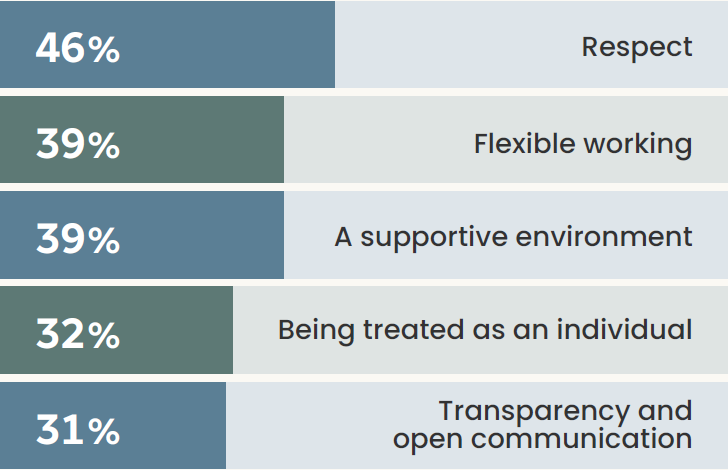
Interestingly, respondents were least likely to consider elements such as tailored benefits (19%), creativity (16%) and regular work socials (13%) to be important when it comes to workplace culture.
This indicates a significant insight: workplace culture outweighs the notion of simply being friends or having fun at work. While these elements contribute to a pleasant environment, they represent just the baseline of what constitutes a progressive and impactful culture. It’s about going beyond the superficial aspects to align with the organisation’s core values and objectives.
How are companies doing?
The study shows that, on the whole, businesses are doing a decent job of building a positive workplace culture. We discovered that 43% of office workers surveyed say their workplace culture is good and just over a quarter (26%) say it’s excellent, while reassuringly few respondents rated their workplace culture as poor (6%) or very poor (4%).
Q. How would you rate your workplace culture?
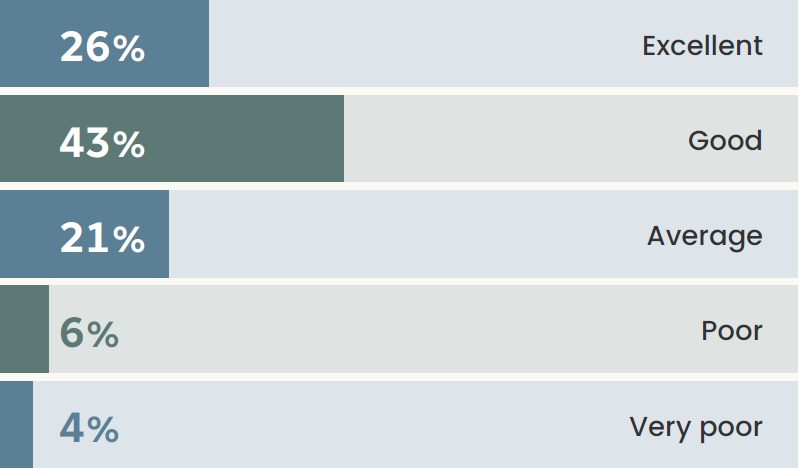
The findings appear to paint a rosy picture. The fact that office workers surveyed are most likely to say that their workplace culture is good is certainly a positive sign.
But is this enough?
Is there any real business value in working towards achieving an excellent workplace culture?
Our research shows without doubt that yes, there absolutely is.
This is supported by 93%1 of the office workers we surveyed, who believe that improvements to workplace culture would impact business performance.
We explore why.
How important is workplace culture?
Our study unmistakeably reveals that office workers view workplace culture as critical to success. In fact, over 9 in 10 (93%) say that workplace culture is important1 to a business’s overall success, with almost 3 in 5 (57%) saying they think it’s very important.
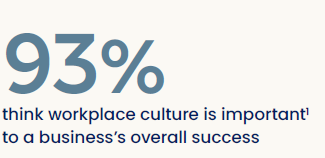
When we analyse the findings more closely, we can see a clear link between how highly respondents rate their workplace culture, and the extent to which they think culture is important to a business’s overall success.
According to the data, over half (54%) of office workers surveyed who rate their workplace culture as good think that workplace culture is very important to success. However, just over 4 in 5 (82%) respondents who rate their workplace culture as excellent say the same.
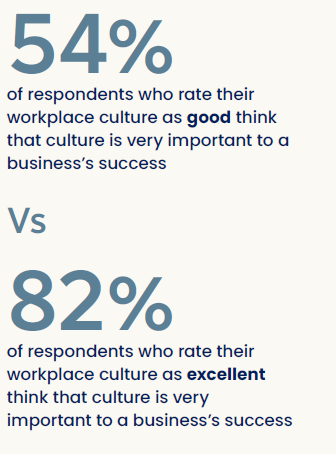
This is the first of many instances in which the findings indicate that, far from being simply a nice-to-have, strong workplace culture is in fact a major aspect in organisations achieving successful business outcomes.
1 ‘Very important’ and ‘Fairly important’ responses combined.
The link between culture and performance

To explain how workplace culture might be impacting business performance, we explore the effect that it has on employees themselves.
Our findings show that culture positively impacts office workers in a variety of ways.
We discovered that:
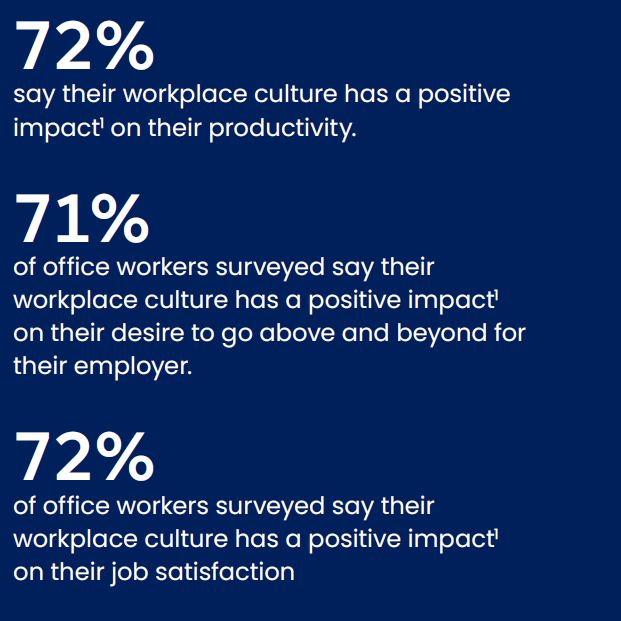
1 ‘Strongly positively impacts this’ and ‘Somewhat positively impacts this’ responses combined.
These findings highlight the ability of workplace culture to positively impact workers’ productivity, desire to go above and beyond and job satisfaction – all factors intimately connected to overall performance. This correlation clearly demonstrates the tangible and direct influence of workplace culture on business outcomes. There is also evidence that culture’s impact on performance becomes even more powerful when companies excel at it. The chart below illustrates that respondents who rate their workplace culture as excellent are far more likely to strongly agree that they are productive in their role, are willing to go above and beyond for their employer, want to stay at their company long-term and are committed to its success.
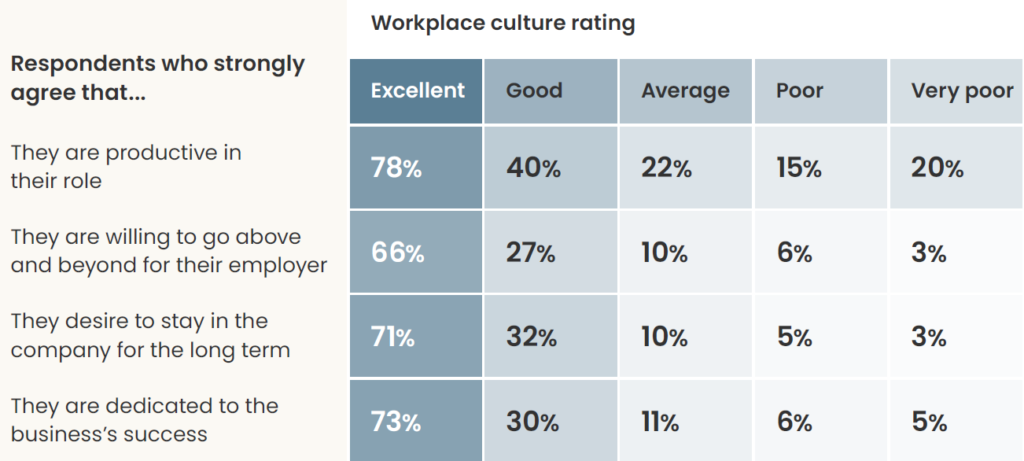
(Q. To what extent do you agree or disagree with the following statements?)
What’s more, there’s a link between having an excellent workplace culture and the likelihood that performance boosting innovation and collaboration are seen to be supported within businesses. While two thirds (66%) of office workers surveyed say that the workplace culture at their company supports innovation, this rises to 9 in 10 (90%) among those who rate their workplace culture as excellent. Similarly, respondents who rate their workplace culture as excellent are much more likely to say their workplace culture supports collaboration than respondents overall (93% vs 72%).
How critical is workplace culture in navigating key organisational hurdles?
Our research also highlighted the crucial role that culture has to play in helping businesses to stay on course when faced with challenges and turbulence.
The findings show that 4 in 5 (80%) office workers surveyed think workplace culture is important2 for helping businesses to navigate through a financial recession. Likewise, almost 4 in 5 (78%) think it’s important2 for overcoming economic uncertainty, while just over three-quarters (76%) believe it’s important2 for staying strong in the face of external market challenges.
Respondents who rate their workplace culture as excellent are much more likely to say that workplace culture is very important in helping their business to stay strong in the face of adversity than those who gave their culture a lower rating, as illustrated by the chart below.
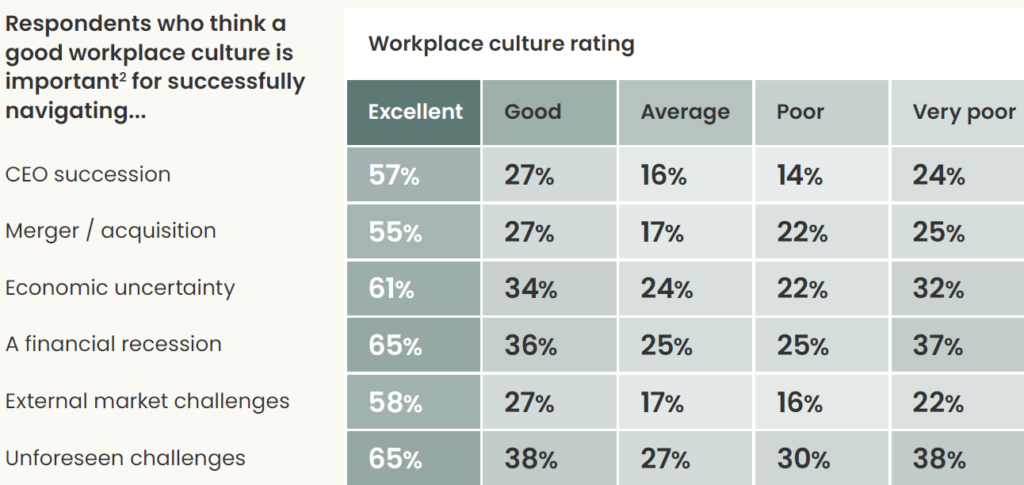
(Q. How important or unimportant do you think a good workplace culture is to successfully navigate the following?)
2 ‘Very important’ and ‘Somewhat important’ responses combined.
A possible reason for this is that excellent workplace cultures are more likely to support adaptability, an invaluable characteristic when it comes to navigating uncertainty. This is reflected by the 94% of office workers surveyed, who believe their workplace culture is excellent and also say the culture at their company supports adaptability, while just 7 in 10 (70%) respondents overall say the same.
Having established the significant impact that workplace culture, and especially excellent workplace culture has on business performance, we explore ways in which businesses can up their cultural game.
Leadership and its influence on culture
In order to understand how businesses can improve their workplace culture, we must first ascertain who is primarily responsible for doing this.
According to our survey results, there is confusion over whose role it is to define workplace culture. The office workers we surveyed are most likely to think that everyone (46%) is responsible for defining culture within their organisation. While just 13% believe that business leaders are primarily responsible.
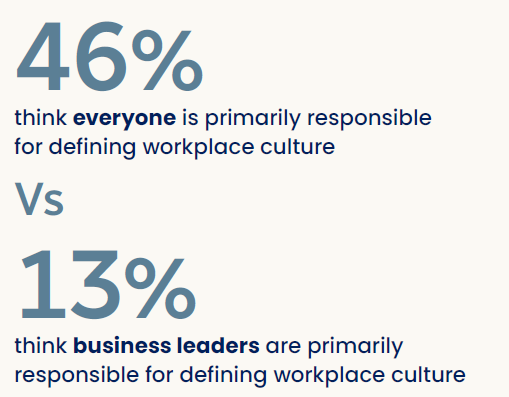
Even leadership teams themselves aren’t convinced that defining culture is their responsibility. We found that less than a third (31%) of C-level execs surveyed think that the CEO / highest person in the organisation is responsible for defining workplace culture, while just 1 in 10 (10%) think this is down to business leaders. Meanwhile, fewer than 3 in 10 (27%) business owners think that the CEO is responsible, with less than 1 in 5 (18%) thinking that business leaders are calling the cultural shots.
While it might be tempting for business leaders to think building a great workplace culture is not in their remit, a closer look at the data reveals that their actions play a pivotal role in shaping the overall work environment.
The role of leadership in building an excellent culture
The findings highlight the powerful impact that leadership alignment with workplace culture has on culture ratings. Respondents who rated the cultural alignment of their leadership as excellent were more than three times more likely to give their workplace culture an excellent rating overall, compared with those who said their culture is just good (69% vs 20%).
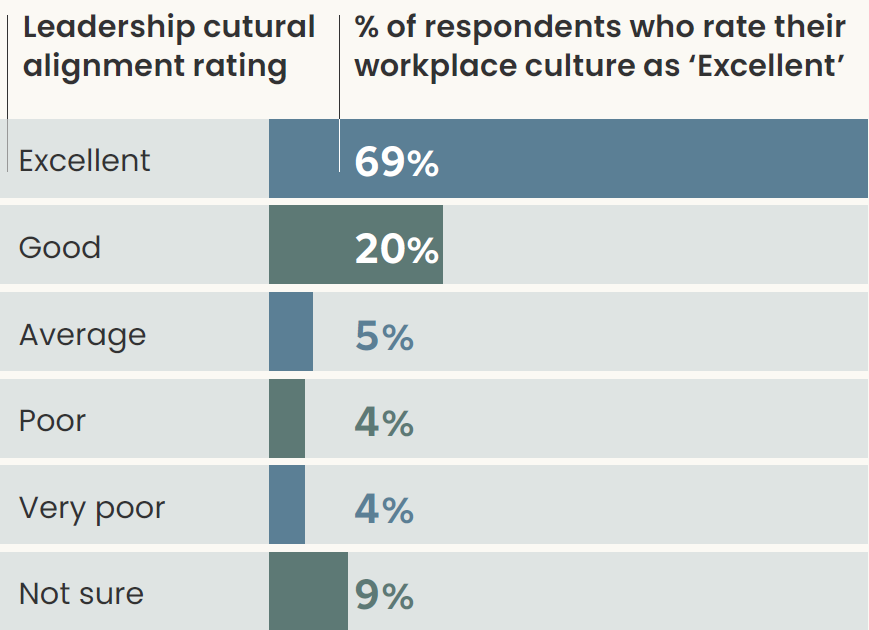
(Q. How would you rate your workplace culture?)
The positive impact of leadership teams aligning with workplace culture is clearly reflected in employee performance. Our survey reveals that almost 4 in 5 (79%) of those we surveyed who say their leadership’s cultural alignment is excellent, strongly agree that they are productive in their role. This is in contrast to the 2 in 5 (42%) of those who said alignment is good, saying the same thing. Meanwhile, just over three quarters (76%) of respondents who say their leadership’s cultural alignment is excellent strongly agree that they are dedicated to their business’ success, compared to just under a third (32%) of those who said alignment is good.
The research clearly demonstrates that despite only a small percentage of those we surveyed believing that business leaders are ultimately responsible for defining workplace culture, they do in fact have a major role to play. Especially if they want their organisation to reap the performance benefits achieved through having an excellent workplace culture.
Yet, leadership is perhaps one of the main reasons that so few businesses are managing to achieve this.
Leadership as a barrier to excellence
The data from our study clearly shows that when it comes to workplace culture, business leaders are failing to lead by example. Leadership (28%) was one of the top responses given by office workers surveyed when asked what they think needs the most improvement in terms of their organisation’s culture.
Meanwhile, a quarter (25%) of respondents say poor leadership is a main factor that negatively impacts their organisation’s culture, making this one of the top three answers, following closely behind high workload (37%) and toxic habits (27%).
And, just a third (33%) of office workers surveyed say they are very confident in their leaders ability to make decisions that align with their company’s culture.
How can leadership improve?
The key to nurturing a thriving workplace culture begins with business leaders themselves, who must set the cultural tone and demonstrate certain characteristics that act as a foundation.
Our survey identified the top leadership qualities that can help to shape a positive and productive workplace culture.
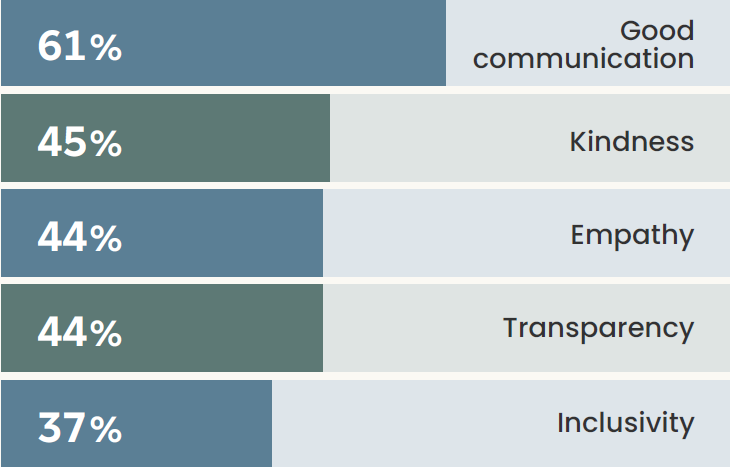
What’s striking is that these qualities all link directly to many of the key elements that office workers think contribute to a positive workplace culture, including respect, a supportive environment, treating everyone as individuals and open and transparent communication.
Building a set of cultural values around these qualities is therefore a great place for leadership to start when seeking to improve their workplace culture.
Effective communication of these values is also key. Our survey data highlights this, revealing that office workers who gave their company’s culture an excellent rating were by far most likely to also say that their company is excellent when it comes to having a clearly communicated mission and values.
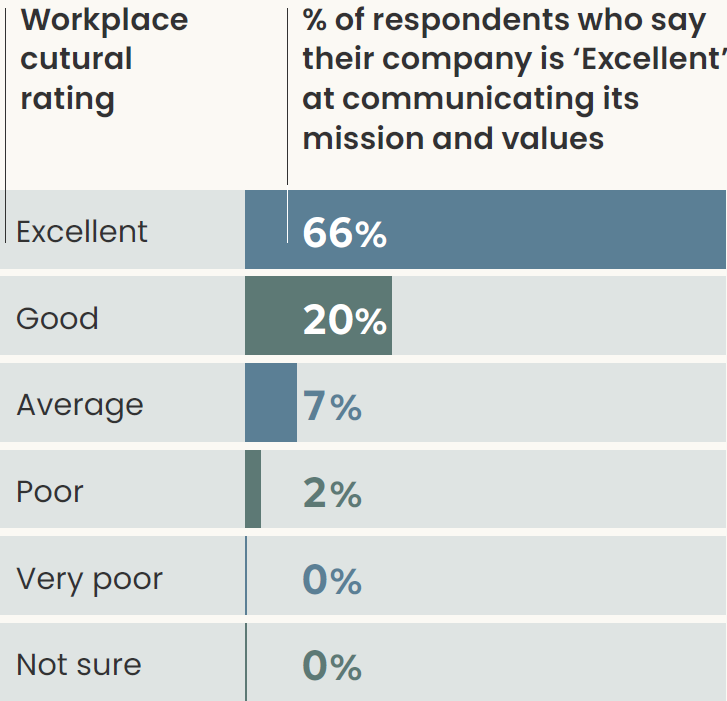
(Q. How would you rate your workplace culture?)
The findings show that what truly sets apart companies with excellent workplace cultures is their leaders’ dedication to embodying their cultural values consistently. Our research reveals a significant gap in this area, showing that almost 4 in 5 (79%)1 office workers surveyed say that the leaders in their organisation don’t always demonstrate their company’s cultural values.
However, there is a clear link between workplace culture ratings and the extent to which leadership demonstrate cultural values. Respondents who rate their workplace culture as excellent are much more likely to say their business leadership always demonstrate cultural values, as displayed in the chart below.
Q. How often, if ever, do leaders in your organisation demonstrate the company’s cultural values?
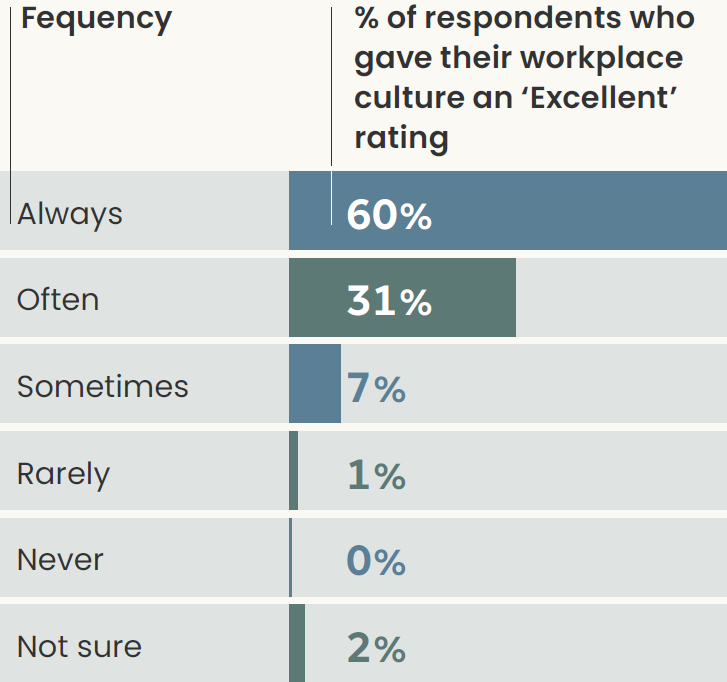
1Reverse % of Always (21%) response
This clearly demonstrates that for leaders hoping to make improvements to their workplace culture, a commitment to always exhibiting the values they are trying to instil across their organisation, is essential.
Aligning culture and strategy
When it comes to boosting performance, our research shows that aligning culture and strategy significantly contributes to achieving outstanding business outcomes. A critical indicator of this excellence is the alignment between an organisation’s culture and its strategic mission. Although only 32% of office workers surveyed overall think that their workplace culture is completely aligned with the mission of their company, this increases to 71% for those who rate their workplace culture as excellent.
Not only is having a well aligned culture and mission linked to having an excellent workplace culture, but there is also evidence to show that this creates an environment for businesses to flourish.
As demonstrated in the chart below, businesses whose workplace culture and missions are aligned are much more likely to support the innovation, adaptability and collaboration required to succeed in highly competitive markets and an uncertain economic climate.

On top of that, our research further suggests that the alignment between a company’s culture and its mission, significantly influences employees’ sense of belonging within their organisation.
Over 9 in 10 (92%) respondents whose organisation’s culture and mission are aligned1 agree2 that their workplace culture makes them feel like they belong3. This is a sentiment shared by just 2 in 5 (40%)3 respondents who feel their organisation’s culture and mission are out of sync4. (Q11)
This sense of belonging is a defining attribute of an excellent workplace culture. Almost 9 in 10 (88%) office workers surveyed who say their workplace culture is excellent feel that their workplace culture definitely makes them feel like they belong, while just 28% of those with a good workplace culture say the same.
1‘Completely aligned’ and ‘Somewhat aligned’ responses combined.
2’Strongly agree’ and ‘Somewhat agree’ responses combined.
3‘Yes definitely’ and ‘Yes, somewhat’ responses combined.
4‘Not that aligned’ and ‘Not at all aligned’ responses combined.
Cultivating excellence in the workplace
1. Culture is much more than a nice-to-have
Culture has a tangible impact on business outcomes. Its power to boost productivity, enhance job satisfaction and improve engagement directly contribute to greater overall performance.
2. Excellence in culture yields exceptional results
Time and time again, the research demonstrates that if businesses wish to improve their performance, putting in the work to achieve an excellent workplace culture is sure to impact growth and success.
3. Leaders must talk the talk and walk the walk
While fostering a positive workplace culture is a collective responsibility, the biggest impact on performance is achieved when leaders recognise how crucial their involvement is in shaping and reinforcing cultural values to ensure they are upheld across their organisation.
4. Culture and strategy should be aligned
Culture may eat strategy for breakfast, but the greatest organisational successes are seen when culture and strategy are seamlessly aligned. This alignment acts as a catalyst for optimal performance and competitive advantage.
Reflections on the findings from the Leader of our People & Culture Practice
In my experience working in the corporate world, culture has often been viewed as a “soft”, undefinable, unquantifiable aspect of business. One that is often overlooked while businesses focus on more tangible metrics such as revenue or market share.
However, what these findings unequivocally show is that culture is the backbone of business. A robust culture, aligned with strategic goals and organisational purpose, often leads to other metrics falling into place quite naturally. Of course, achieving an exceptional workplace culture is an evolving process and does not happen overnight.
At Redgrave, we pride ourselves on our deep understanding and expertise in navigating the nuances of organisational culture. Our People & Culture practice has observed a significant evolution in how HR leaders partner with other business leaders to steer business culture.
This evolution informs our approach, which extends beyond simply identifying skilled leaders.
Our People & Culture practice, with its rich insights and experiences, is committed to guiding our clients in finding leaders who are both culture shapers and performance enhancers, ensuring a harmonious and prosperous ecosystem.
Our focus on values, cultural alignment and ‘culture-add’ is integral to this approach, ensuring that the leaders we connect our clients with are not just delivering their immediate needs but are pivotal in advancing their cultural journey.
Our commitment to this involves continually refining and enriching our own cultural ethos, creating an ecosystem where our clients, our colleagues, and our organisation prosper in unison.

Naomi Barton, Partner, Head of People & Culture Practice








